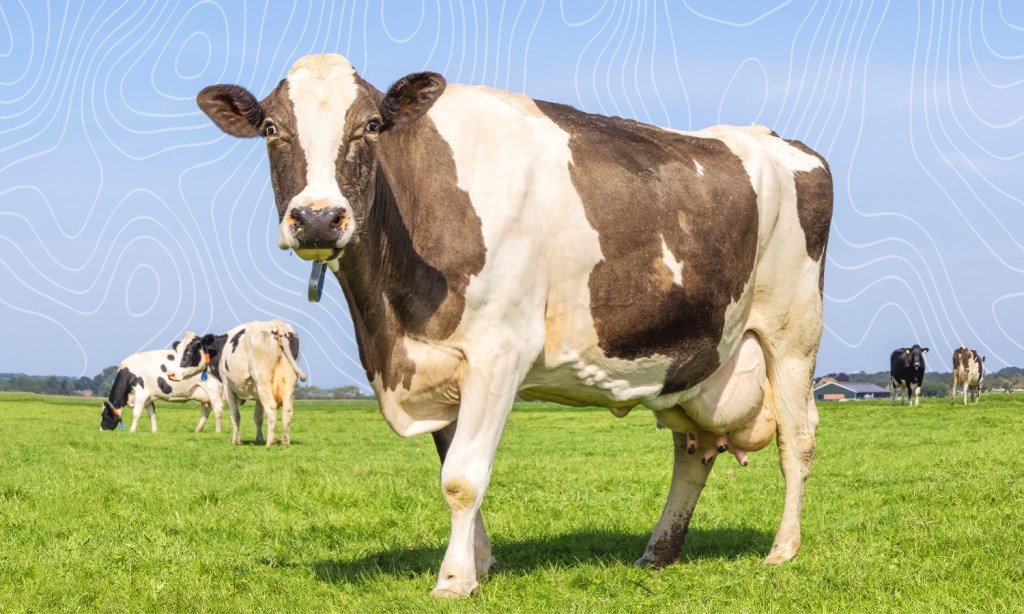Agriculture is one of the biggest contributors to climate change on the planet. But it’s not because of the transport, or the chemicals used in manufacturing (although, it’s also those things).
The biggest reason why agriculture is a major climate change issue? Cow farts.
Giggle all you like, but cow farts are a serious, serious issue.
According to the Climate Council, 13% of our greenhouse gas emissions are produced by agriculture. Of that, 42% of those emissions are the result of cows and other livestock farting and burping all over the joint, releasing methane into the atmosphere as plant material ferments in their stomachs.
Methane has anywhere from 28 to 100 times more impact on the warming of our planet than carbon dioxide. Although, the two aren’t entirely comparable as methane breaks down significantly faster than carbon dioxide. Still, international bodies, like the United Nations, have singled out the gas as an important focus for getting our greenhouse gas emissions down overall.
New Zealand proposed a tax on livestock methane emissions earlier this week, a first-of-its-kind measure to reduce the impact of agriculture. Kiwi farmers though are not happy about it, suggesting that it would “rip the guts out of small-town New Zealand.”
In the US, President Joe Biden unveiled a major plan during COP26 last year to reduce global methane emissions by 30%. The multilateral agreement, signed by 90 countries including the often reticent Brazil, aims to get levels down by 2030.
Although the agreement includes two-thirds of the global economy, half of the top 30 methane-emitting countries have not signed up. These include Russia, China, India, and, uh, us.
Since 2021, Biden’s administration has been trying to sign other countries to agree to his Global Methane Pledge. Australia’s Agricultural Minister, Murray Watt, recently told ABC Radio RN that the government has been consulting with industry bodies over the agreement and that the country could well be very close to signing up.
Watt described the deal as “an aspirational goal from the world to bring down our methane emissions, which is something not only that I support, but that most farm groups support”.
“Meat and Livestock Australia, the Red Meat Advisory Council and other groups have already got commitments in place to reach carbon-neutral meat production by 2030. We’re working closely with the industry to help them reduce their methane emissions.”
The ABC is reporting that the government is basically laying the groundwork for the announcement which could be made at a global climate summit in November.
This agreement though, like basically everything in Australia, is not going to be made without a bit of a scrap. Nationals leader David Littleproud responded to Watt’s commentary by saying that the methane pledge would be “the death of the Australian BBQ.”
“We know Australians love their sausages, steaks, rissoles and lamb meals — all of that will become out of reach for many. We do not want to see the Aussie BBQ available to only the rich — we urge Labor to reject the methane madness idea and embrace the Aussie BBQ spirit instead of destroy it,” Littleproud said in a statement.
It’s eerily reminiscent of the time that former Prime Minister Scott Morrison announced that an eclectic vehicle wouldn’t be able to pull a boat and would kill the weekend entirely.
How Do You Stop a Cow From Farting?
Cows produce methane because they have a pre-digestion stomach called a rumen. This organ is filled with microbes called methanogens which are able to break down rough plant matter but produce methane as a by-product of doing so. Cows then burp or fart out this gas which goes off into the atmosphere and kills polar bears.
So, stopping these methanogens is crucial. The WA Department of Primary Industries and Regional Development recommends using feed additives for livestock. Nitrates, for example, can make cows produce ammonia rather than methane. They say that adding nitrates, fats and oils to the diet of cows can remove as much as 372 tonnes of carbon dioxide equivalent gas per 600 cows.
One of the more out-there ideas is to strap backpacks to cows to capture all the methane they expel, creating personal hot air fart balloons. The gas can then be stored and used elsewhere.
Perhaps the most straightforward approach is simply diet changes, and for that, we have an innovative solution. CSIRO has been working in collaboration with industry partners on food for cows made out of native Australian Asparagopsis seaweed.
Called ‘FutureFeed’, they say that just a handful of the stuff “drastically reduces the greenhouse gas contribution from agriculture.” Not only this, but it appears to be much healthier for the cows, helping them to grow bigger.
“If just 10% of global ruminant producers adopted FutureFeed as an ingredient to feed their livestock, it would have the same impact for our climate as removing 100 million cars from the world’s roads,” they say.
“And potential increases in livestock productivity could create enough food to feed an additional 23 million people.”
Sounds like a win-win. CSIRO has seven licensees across the world for FutureFeed distribution and says that the product is already creating new industries for coastal communities as demand begins to outstrip supply.
“There is so much work being done by our farmers in sustainability and we are proud to be a tool for their emissions management,” Eve Faulkner from FutureFeed told the AFR.
Far from being something that would kill the weekend, it seems methane production could very well end up saving it. That’s if you require stacks of steak and a thriving economy for your weekend to be saved, that is.
Related: The NSW Floods Are Bad News For Lettuce Prices, But Worse For Farmers
Related: Climate Change Threatens Our Food, Here’s How to Help According to a Farmer and Scientist
Read more stories from The Latch and subscribe to our email newsletter.

